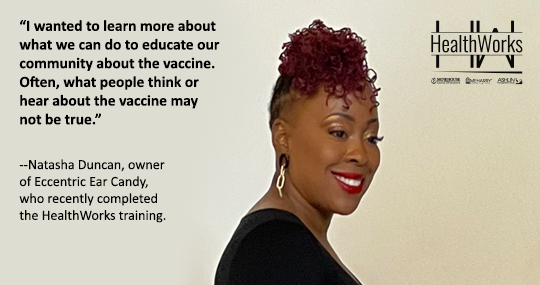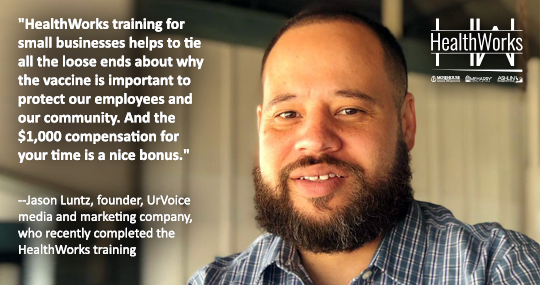Innovation Learning Laboratory
- Home
- Our Story
- Projects
- Toolkits
- Educational Programs & Opportunities
- Highlights & Outcomes
- Partnerships
- Publications
- Technical Assistance
- Internship Opportunities
campus portal

Projects
The Innovation Learning Laboratory for Population Health designs and implements demonstration projects that generate innovative technology-driven healthcare models and fuel teaching and learning for population health improvement. The goals and objectives of these projects are to increase the number of trained community health workers to assist with community health programs in underserved communities.
Healthworks
The overall goal of the HealthWorks Project is to reduce COVID-19 health disparities and advance health equity by strengthening vaccine confidence. This is done through providing trusted cultural and linguistically appropriate information and education. This project enhances access to COVID-19 vaccine and booster uptake to diverse, medically underserved populations in Georgia and Tennessee.
Goals & Objectives:
- Establish and train workforce of Outreach Workers in Georgia and Tennessee.
- Deploy 200 Outreach Workers in Georgia and Tennessee to conduct vaccination events in communities across Georgia and Tennessee
- Increase vaccine uptake among small business work force.
- Increase vaccine uptake among employees and relatives of employees of potential super spreader businesses.
- Use data driven strategies to improve COVID-19 vaccine uptake among medically underserved communities.
Click Here to view and download our final report.
Testimonials:
 |
 |
Darlene Bey experience on HealthWorks Project: " It was my pleasure working for Morehouse School Of Medicine. I have learned so much from this opportunity. "
Please visit https://www.healthworks.health or contact Frank Sutton for more information.
NCRN CHW Mobilization
Created to mitigate the impact of COVID-19 on racial and ethnic minority, rural, and socially vulnerable populations.
Goals & Objectives:
- Identify and engage disproportionately impacted communities
- Nurture existing and develop new partnerships
- Disseminate culturally and linguistically appropriate information
- Leverage technology to connect communities to resources
- Monitor and evaluate
- Apply broad and comprehensive dissemination methods
Please visit https://ncrn.msm.edu/s/ for more information.
Students Hanging Out with Seniors (S.H.O.W.S.)
Students Hanging Out With Seniors (S.H.O.W.S.) was developed to improve the social connections, health, and well-being of the 65 and over senior population during the COVID-19 pandemic and its aftermath. In collaboration with the Compassionate Cares course offered at Morehouse School of Medicine, third year medical students engaged assisted living seniors through weekly bio-directional virtual interaction introducing themes to the seniors specific to the geriatric population including fall risk assessment and cognitive testing. This provided both the students and seniors with social connections while the students were able to enhance their medical knowledge of the geriatric population.
Goals & Objectives:
- To create social support through psychosocial and educational intervention thereby reducing isolation and loneliness
- To develop physicians who are competent and knowledgeable in the delivery of quality and compassionate care of the older adult
- To increase interprofessional communication becoming competent in teamwork. Our partners include AARP Foundation and Mercy Housing.
For more information, contact Frank Sutton or Somilez Francis.
Doris Duke Foundation Indigenous American Mental Health Worker Adaptation Pilot
We are developing a culturally and linguistically appropriate Native American (American Indian)/ Alaskan Native adaptation of the High School & Young Adult Community Health Worker Training program. This innovative initiative will be based on best practice modeling and lessons learned from our original HSYACHW Training Program. This initiative will align three focal components to address mental health and wellbeing among youth: mental health literacy training, community-based mental health intervention (i.e., communication campaign + service linkage), and year-round engagement through mental health screening and reinforcing lessons. The virtual training and engagement for the year will be open to all high school students and recent high school graduates within identified AI/AN communities which will be determined.
The initiative will be implemented over a two-year period and will train high school CHWs to engage their peers, schools, and community in strategies for better mental health and wellness, specifically mitigation of the effects of COVID-19. Utilizing our existing training infrastructure combined with the NCRN dissemination platform, we propose to train 60 HSYACHWs in identified indigenous areas to serve as primary deliverers of mental health education within their schools and communities. Participants will be involved in the development and implementation of a mental health public messaging campaign to cover topics including stress, substance and alcohol abuse, and suicide. They also learn strategies for mitigating mental health emergencies and work with peers to implement community-based mental health initiatives.
As part of this initiative, student participants will be trained in Community Health Worker competencies with a focus on COVID-19 education, mental health education, resource navigation, infection prevention and control, and mitigating the impact of the pandemic on vulnerable populations. This will be accomplished through the HSYAHCW Online Training Curriculum, youth-tailored COVID-19 educational workshops, mental health activities, peer-to-peer education, and monthly health monitoring and wellness checks for peers, family, and community members.
Goals & Objectives:
- Train high school and young adult CHWs in identified indigenous areas to engage their peers, schools, and community in strategies for better mental health and overall wellness.
- To implement and validate the success of the adapted HSYACHW within the target population to mental
- health literacy training and improved mental health
For more information, contact Frank Sutton.
RCMI NIH Supplement Haitian American Mental Health Worker Adaptation Pilot
To examine and decrease COVID-19 vaccination hesitancy among the Haitian American immigrant population, and to decrease mental health disparities among underserved youth, our team proposes to culturally adapt, implement, and conduct a preliminary validation of a youth (18-24) led health and mental health education campaign to address COVID-19 related psychosocial stressors. Our central hypothesis is that through participation in this program, young adults become active agents in the development of positive health outcomes for themselves, their families, and community. Participation in HSYACHW will encourage healthy behaviors and better health outcomes, while helping to mitigate the adverse emotional effects of COVID-19 and vaccine hesitancy among underserved young adults.
Goals & Objectives:
- Increase the number of trained young adult mental health workers to assist with mental health education in underserved communities.
- Provide mental health monitoring and mental health literacy activities to family member and community members.
- To increase mental health resources and improve health equity to local communities.
- To promote mental health education and mental health literacy in schools and communities.
- To introduce a new cadre of emerging adults to the field of mental health and turn them into workers able to take an active role in the health and mental wellness of their community.
For more information, contact Frank Sutton.
CETOUR
In 2020, Morehouse School of Medicine received a $1 million grant from the United States Department of Health Resources and Services Administration to create the Community Education and Training In Opioid Reduction (CETOUR) Program, which aims to reduce opioid misuse and abuse, increase treatment capacity for opioid abuse and overdose, increase utilization of services for treatment and recovery of substance abuse, and leverage technology to provide additional support and access for treatment for SUD/OUD in rural North Georgia. Folashade Omole, MD, FAAFP and Arletha W. Livingston (Lizana), PhD, MPH, MBA lead this program as the principal investigators.
During this three-year grant, CETOUR has implemented activities to increase awareness of opioid misuse, abuse, and treatment options to the residents of Fannin, Gilmer, and Pickens counties thereby increasing the advancement of health equity in rural North Georgia. Some of the actives and partnerships include the development and dissemination of opioid recovery resource guides, distribution of Deterra safe at home drug deactivation system to clinics and community centers, community and law enforcement narcan training events, increased patient screening for alcohol and substance abuse, and improvement of data capture through Overdose Detection Mapping Application Program (ODMAP), a data surveillance tool the state of Georgia recommends for emergency OD response.
CETOUR has also established partnerships with the Appalachian Judicial Circuit, the Georgia Family Connections, and Fannin County school system where the MSM Opioid Reduction Training Program was taught to educate high school students on the dangers of opioid misuse and resources to locate help.
Goals & Objectives:
- CETOUR aims to enhance access to specialized addiction treatment and education for individuals grappling with opioid use disorder (OUD) in rural North Georgia, where limited resources pose significant barriers to care.
- CETOUR seeks to establish a cohesive network capable of effectively addressing the multifaceted challenges associated with opioid misuse in the community.
- CETOUR's overarching goal is not only to provide education but also to mitigate the stigma surrounding OUD, thereby creating a supportive environment where individuals can seek resources and support without fear of judgment, ultimately promoting prevention, treatment, and recovery.
Testimonial:
"This is a way to prepare your teens for not only the challenges they are seeing in the community, but also to prepare them for college." ~ Bob Surrusco
For more information, contact Somilez Francis
Deloitte Health Equity Institute: Community Mental Health Worker Collaboration
The project is aimed at addressing the underlying causes of health inequities, including lack of youth workforce development options and inadequate mental health resources for youth. The vision of this work is to address workforce development and community mental health through Indigenous American and Haitian American cultural adaptations of MSM High School and Young Adult Mental Health Workers program. The program will enable this vision through a scalable culturally humble training for youth, and an increase in cultural responsive mental health resources.
Goals & Objectives:
- Foster self-reliant and empowered communities that take ownership of their health outcomes by building trust and strengthening local engagement.
- Deliver scalable, culturally humble training for youth while increasing access to culturally responsive mental health resources to foster equity and resilience in underserved communities.
- Assess the effectiveness of the youth-focused community mental health program in improving mental well-being and reducing symptoms of depression among participants.
Mom’s Heart Matters
Mom’s Heart Matters is a maternal health pilot launching at Liberty Regional Medical Center in Hinesville, Georgia. It aims to reduce the disproportionately high rates of disease and death among Black mothers with high blood pressure. The initiative receives funding from Amerigroup and the Annie E. Casey Foundation and spans a host of partners: Georgia Family Connection Partnership, Georgia OBGYN Society, Morehouse School of Medicine and Liberty Regional, which is one of two hospitals in the state delivering high-quality obstetric care to rural communities. The Casey Foundation also is supporting an evaluation of the initiative by the Morehouse School of Medicine.
Goals & Objectives:
- Equip the healthcare team with tools and resources
- Enhance patient care coordination within the healthcare system
- Reduce the overall cost of care for women with chronic hypertension in the immediate postpartum period
- Address health disparities by overcoming the challenges women face due to social determinants of health
- Improve population health focused practice and policy
- Reduce adverse outcomes of hypertension among postpartum women
- Improve Georgia’s maternal and mortality statistics
For more information, contact Matthew Calhoun.
Care Cannabis: Medical Cannabis Patient Education by Community Health Workers
The program is aimed at training and deploying Community Health Workers (CHWs) to provide medical cannabis patient education for Morehouse Healthcare. This innovative initiative addresses the need for improved patient care, education, and engagement surrounding medical cannabis usage. The integration of medical cannabis into mainstream healthcare practices has gained significant attention due to its potential therapeutic benefits for various medical conditions. The program will leverage CHWs to enhance patient trust, broaden therapeutic options, reduce opioid prescriptions, and foster better patient-provider communication.
Goals & Objectives:
- Revolutionize medical cannabis patient education by leveraging the expertise of Community Health Workers.
- Train and deploy Community Health Workers to provide comprehensive medical cannabis patient education.
- Enhance patient care, trust, communication, and knowledge by way of Morehouse Healthcare's commitment to holistic patient well-being.
- Ensure that patients receive accurate information about the diverse therapeutic applications of medical cannabis, allowing them to explore alternative treatments.
For more information, contact Frank Sutton.
